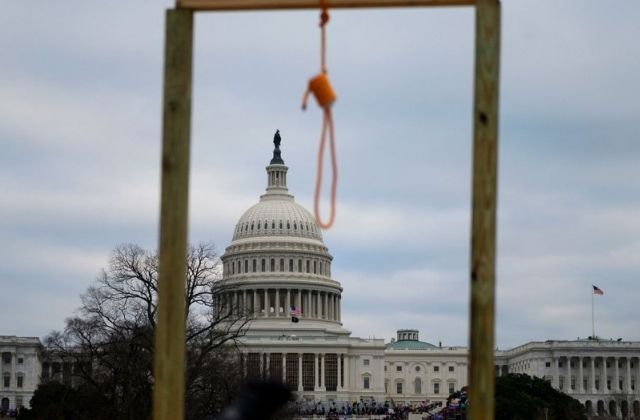On January 20, during Joe Biden’s inaugural address, he became the first U.S. president in history to call out white supremacy as terrorism in an inauguration speech, according to Newsweek. For many who watched the ceremony, the new president’s denouncement felt poignant, considering where he gave the speech — outside of the U.S. Capitol in Washington, D.C., surrounded by armed national guards, —as a result of a white mob that rioted and killed a Capitol police officer just two weeks prior.
In speaking about the nation’s ongoing struggle against racism, Biden said:
“A cry for racial justice some 400 years in the making moves us. The dream of justice for all will be deferred no longer. A cry for survival comes from the planet itself. A cry that can’t be any more desperate or any more clear. And now, a rise in political extremism, white supremacy, domestic terrorism that we must confront and we will defeat.”
So what now that the beast has been publicly named? In the weeks following the Capitol riot, various news outlets have reported that more than 200 people were deemed suspects and as many have been charged, including Capitol police. Former President Donald Trump was impeached for a second time for inciting the insurrection but was acquitted in a 57-43 vote by the U.S. Senate. And so even after President Biden took the step to call out white supremacy, it still doesn’t feel as if the country is moving fast enough to eradicate it.
“This country has a long history of white supremacy, which has a different definition than institutional white supremacy. In a country that has slowly tried to address its original sin, if you will, it hasn’t always looked inside, as it has outside,” Oren Segal, vice president of the Anti-Defamation League’s (ADL) Center on Extremism, told Colorlines.
On a legal level, Segal said it’s complicated. For example, the U.S. doesn’t arrest citizens for hateful thoughts or speech, which means individuals and groups can organize unbothered. Then there’s a public perception problem, where men who are not white and who commit hate crimes are often labeled terrorists, while white men are seen as having mental health issues. And most disturbing are law enforcement agents who engage in racists acts, such as the 35 Capitol police officers who are under investigation for their role in the January 6 riot.
“There’s more that the federal government can do in order to show that they take this threat seriously,” said Segal, who shared a data point from ADL research. “In the past 10 years, if you look at all of the extremist-related murders, 75 percent have been carried out by right-wing extremists.”
Indeed, the federal government is aware.
Mike German, a Brennan Center for Justice at NYU Law School fellow and former Federal Bureau of Investigation (FBI) agent, published the report “Hidden in Plain Sight: Racism, White Supremacy, and Far-Right Militancy in Law Enforcement,” in August 2020. And later that October, the Department of Homeland Security’s (DHS) "Homeland Threat Assessment" called white supremacist extremists “the most persistent and lethal threat in the Homeland” and “since 2018, they have conducted more lethal attacks in the United States than any other DVE [domestic violent extremists] movement.”
“Policymakers have to put pressure on the Department of Homeland Security and the FBI so that they acknowledge white supremacist and far-right groups as significant in the context of their counterterrorism responsibilities,” German told Colorlines in October. “Then you’ll see more aggressive attention paid to these groups before they commit significant harm.”
Part of this pressure would come from a high-level anti-domestic terrorism czar, who is afforded the same resources to find and take out white hate groups the way they’ve surveilled and prosecuted Islamic extremists. Congress also needs to address racist policies, such as housing and educational discrimination, and ban law enforcement from profiling while at work. Police and military departments should be required to track and scrub their culture and ranks of all who subscribe to white supremacy, to avoid a repeat of the Capitol. While German said he is hopeful that the attack on Capitol police changes the way law enforcement and all of government views the problem of white supremacy, he’s also worried that white supremacists may still be viewed as outliers.
“Based on the charges resulting from the attack so far, it appears the Justice Department and FBI are treating the Capitol attack as a sui generis event, rather than recognizing it as the latest in a pattern of far-right militant attacks that took place in public over the last four years. They also seem to have prioritized arresting people photographed inside the Capitol — the unauthorized entry cases can wait — rather than those assaulting police officers and press outside the Capitol,” German said. “I hope they realize that the people who engaged in violence pose a continuing threat. Pretending this was a one-off event forfeits a ton of evidence of criminal activity that preceded the Capitol attack that could be used to demonstrate the intent of the attackers.”
Now that the world has seen what happens when law enforcement and political leaders ignore white supremacists, many will be watching to see if President Biden keeps his promise to defeat “political extremism, white supremacy, domestic terrorism,” as he said on January 20.
